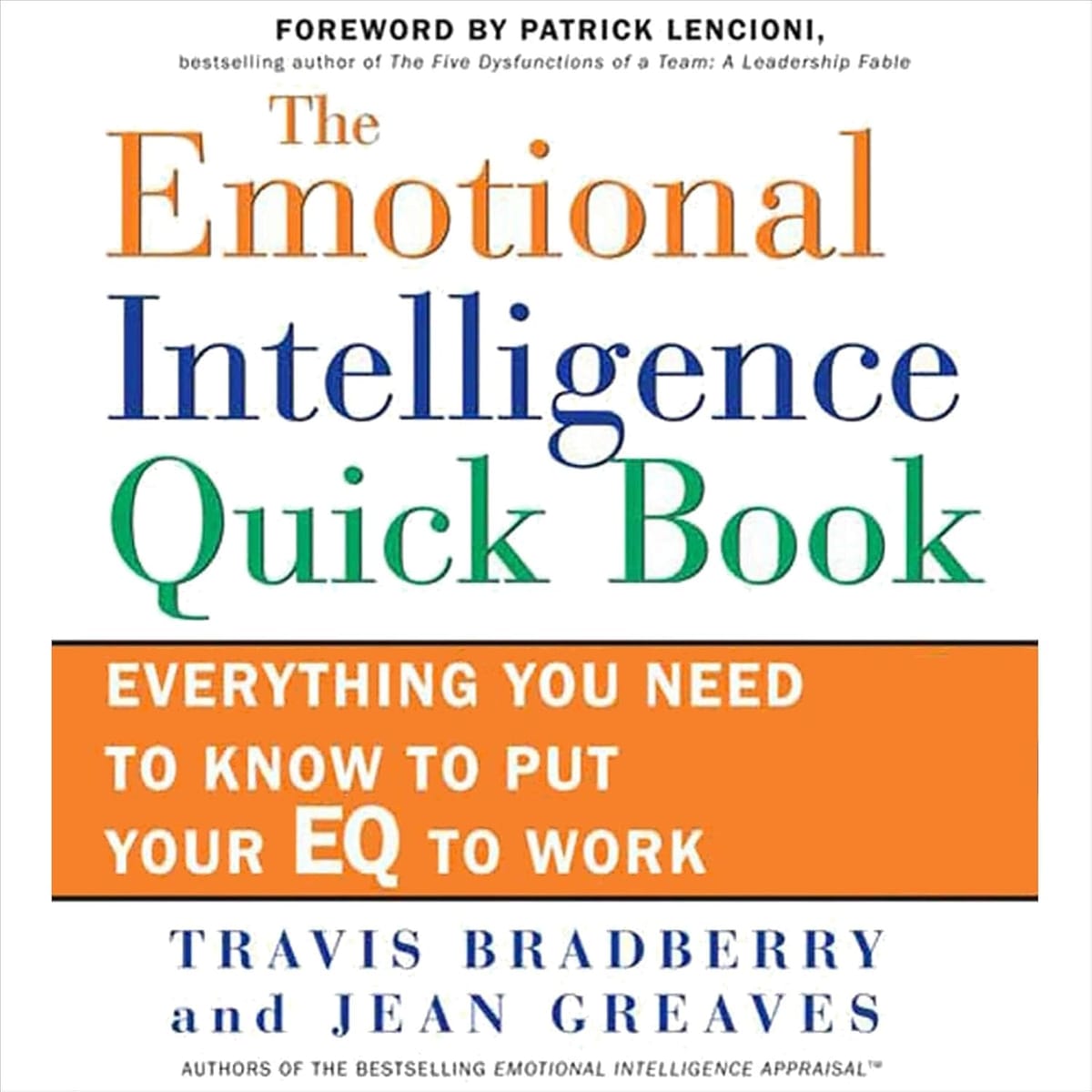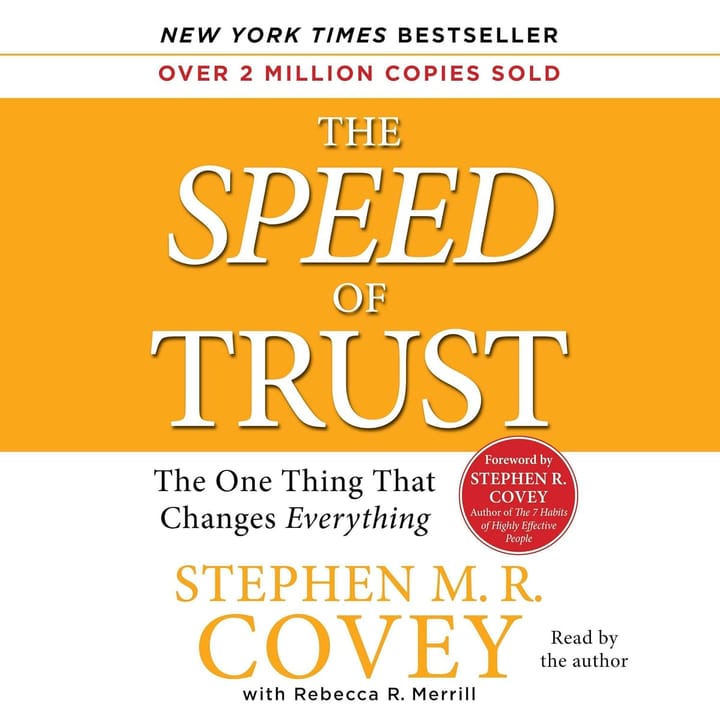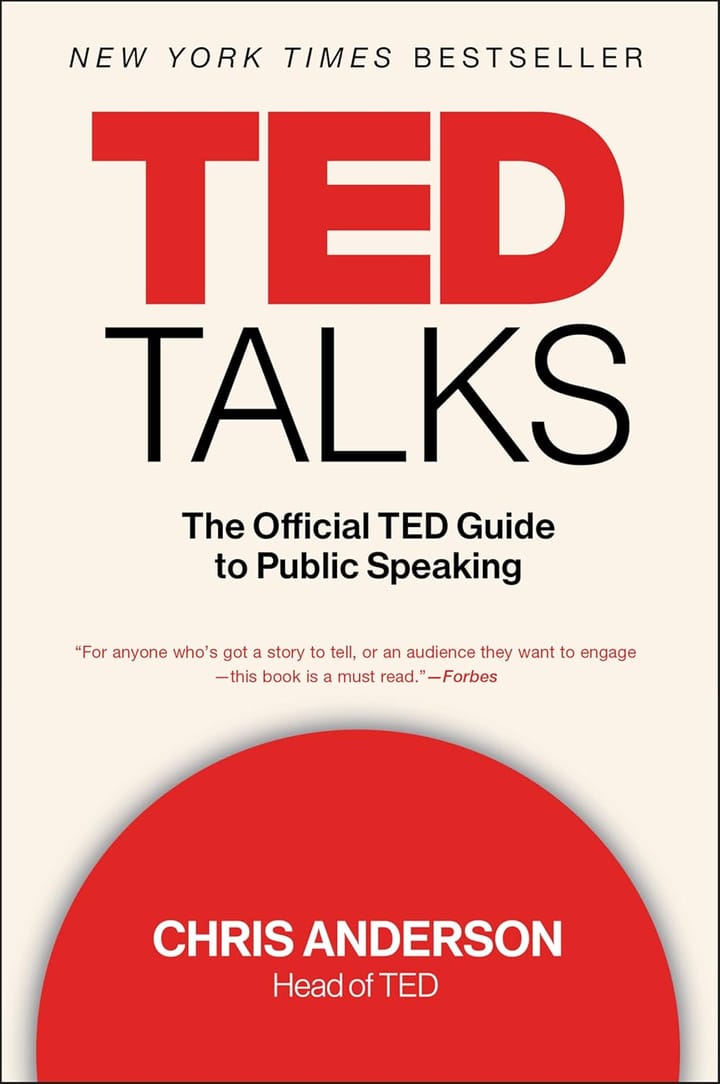Book Summary: The Emotional Intelligence Quick Book
Discover the key principles of emotional intelligence in The Emotional Intelligence Quick Book by Travis Bradberry and Jean Greaves.

Essential Insights
- The Emotional Intelligence Quick Book provides practical strategies for improving emotional intelligence in both personal and professional settings.
- The book emphasizes the importance of self-awareness, self-management, social awareness, and relationship management in developing emotional intelligence.
- Readers can benefit from the book's actionable advice and exercises designed to enhance emotional intelligence skills and improve overall well-being.
Introduction to The Emotional Intelligence Quick Book
The Emotional Intelligence Quick Book by Travis Bradberry and Jean Greaves is a powerful resource that delves into the essential aspects of emotional intelligence and how it impacts our personal and professional lives. Bradberry and Greaves, renowned experts in the field of emotional intelligence, provide practical insights and strategies to help individuals enhance their EQ and navigate the complexities of relationships and leadership roles.
For individuals seeking to improve their leadership skills, foster better communication, and create more meaningful connections with others, this book is a valuable tool. The Emotional Intelligence Quick Book not only offers a deep understanding of emotional intelligence concepts but also provides actionable steps and exercises to help readers apply these principles in their daily interactions. Whether you are a seasoned professional or someone looking to grow in your personal development journey, this book offers practical guidance that can have a transformative impact on your relationships and overall success.
Buy "The Emotional Intelligence Quick Book" on Amazon
Summary of The Emotional Intelligence Quick Book
The Emotional Intelligence Quick Book emphasizes the importance of emotional intelligence as a key component in personal and professional success. It outlines the four core skills of emotional intelligence: self-awareness, self-management, social awareness, and relationship management. By developing these skills, individuals can better navigate their emotions and those of others, leading to improved communication, stronger relationships, and enhanced leadership capabilities. The book presents practical strategies for readers to build their emotional intelligence, focusing on the tangible benefits it brings to various aspects of life. What sets this book apart is its combination of scientific research and practical advice, making the concepts easily accessible and applicable.
The authors offer engaging anecdotes and relatable examples to illustrate their points, which helps readers connect with the material. Additionally, the book includes self-assessment tools that allow individuals to evaluate their emotional intelligence and track their progress over time. This hands-on approach not only makes the content more interactive but also empowers readers to take charge of their personal development journey. As readers explore the ideas presented in The Emotional Intelligence Quick Book, they are encouraged to reflect on their own emotional experiences and the role those experiences play in their interactions with others.
Notable concepts such as the impact of emotional intelligence on decision-making and conflict resolution serve as a foundation for understanding how emotions influence behavior. This understanding is vital for anyone looking to enhance their leadership presence and enrich their personal growth. By fostering emotional intelligence, readers can unlock new opportunities for success and deepen their connections with others.
Key Lessons From The Emotional Intelligence Quick Book
Understanding Emotional Intelligence
The concept of emotional intelligence revolves around the ability to recognize, understand, and manage our own emotions while also being aware of and influencing the emotions of others. This fundamental skill is crucial not just for personal well-being but also for effective communication and interpersonal relationships. By grasping this dual focus on oneself and others, readers can significantly enhance their social interactions and decision-making processes.
In the book, Bradberry and Greaves outline various components that make up emotional intelligence, including self-awareness, emotional regulation, and empathy. For instance, they illustrate how a leader who is self-aware can better navigate the complexities of team dynamics. This leader recognizes their own emotional triggers, allowing them to respond appropriately to challenges rather than react impulsively. Understanding this concept encourages readers to cultivate greater self-awareness and strive for emotional competence.
This lesson is significant as it lays the groundwork for personal and professional development. By enhancing emotional intelligence, individuals not only improve their relationships but also become more adept at resolving conflicts and fostering teamwork. Such skills can inspire readers to assess their current emotional capabilities and encourage growth, ultimately leading to more fulfilling interactions in both their personal and work lives.
The Importance of Empathy
Empathy is the ability to understand and share the feelings of others, and it is a cornerstone of emotional intelligence. The book emphasizes that cultivating empathy allows individuals to connect with others on a deeper level, fostering trust and understanding. For example, a manager who practices empathy can more effectively support team members facing personal challenges, thereby creating a more inclusive and supportive work environment.
The authors provide scenarios in which empathetic leaders can better motivate their teams and address issues before they escalate. By honing this skill, readers can learn to appreciate different viewpoints and create a culture of collaboration. Empathy serves as a catalyst for positive interactions, reducing misunderstandings and enhancing teamwork.
Emotional Regulation Strategies
Emotional regulation refers to the ability to manage and respond to emotional experiences, whether they be positive or negative. The book discusses various strategies that individuals can use to maintain emotional balance, such as mindfulness techniques or cognitive restructuring. Through these methods, readers can learn to pause and reflect before reacting, significantly improving their decision-making and interpersonal interactions.
The Role of Self-Awareness in Personal Growth
Self-awareness is a foundational element of emotional intelligence that involves recognizing one’s own emotions, strengths, and weaknesses. The book highlights that developing self-awareness enables individuals to make informed choices and minimizes impulsive actions based on emotional states. For example, by reflecting on past experiences and recognizing emotional patterns, someone can identify triggers and better navigate similar situations in the future.
Application Ideas for The Emotional Intelligence Quick Book
Understanding and Managing Emotions
One of the fundamental lessons from The Emotional Intelligence Quick Book is the importance of recognizing and managing your own emotions. An actionable step is to start a daily journal where you note your feelings and the triggers behind them. By setting aside just a few minutes each day, you can begin to identify patterns in your emotions and understand how they affect your reactions. This practice allows you to gain better control over your emotional responses.
Incorporating this journaling habit into your routine can be as simple as jotting down your thoughts before going to bed. Over time, you may find it easier to identify situations that evoke strong emotions, which can help in adjusting your responses in similar future situations. Not only does this enhance self-awareness, but it also promotes emotional regulation, which is crucial for effective leadership.
A practical application of this is to share your findings with a trusted colleague or friend. This open communication can create a supportive environment and lead to richer discussions about emotional experiences. Additionally, consider setting reminders on your phone to help you stay committed to this reflective practice. A final idea is to explore resources focused on emotional literacy, deepening your understanding of emotions. For example, leaders who actively manage their emotions can better handle conflicts and foster a more positive workplace culture.
Developing Empathy
Another critical element highlighted in The Emotional Intelligence Quick Book is the cultivation of empathy. A straightforward approach to building empathy is to practice active listening. This involves focusing entirely on the speaker, maintaining eye contact, and refraining from planning your response while they speak. It shows the other person that their thoughts and feelings are important, fostering better relationships.
To implement this, set aside time during meetings to genuinely engage with your team members. Ask open-ended questions and encourage them to share their viewpoints. This practice not only helps to build trust but also gathers valuable insights that can enhance decision-making. You can also take this further by creating a feedback loop where team members are prompted to express how they feel about decisions and activities.
Taking small steps, like summarizing what someone has said to confirm understanding, can reinforce your commitment to empathy. Additionally, establishing a "no interruption" rule during discussions can facilitate a more profound exchange of ideas. A real-world example of this is seen in companies that prioritize open dialogue and regular feedback; employees who feel heard are more engaged and aligned with organizational goals, leading to improved team performance.
Enhancing Relationship Management Skills
Effective management of relationships is a significant aspect of emotional intelligence emphasized in the book. One way to enhance this skill is by practicing regular check-ins with your team or peers. This could involve weekly one-on-one meetings or informal catch-ups to evaluate how everyone is feeling about their work and team dynamics. Such interactions can help you spot potential issues early on and build rapport.
Implement this strategy by blocking time in your calendar specifically for these check-ins. Make it a point to genuinely listen to their concerns and provide timely feedback. This establishes not only trust but also encourages an open culture where team members feel safe to express their thoughts. Encourage team members to share their experiences, as it can lead to greater accountability and a more cohesive unit.
Additionally, consider employing team-building activities that foster relationship building outside the standard work environment. This might include group lunches or offsite meetings. Consistency is key—regularly investing in team relationships significantly enhances collaboration and morale. A notable example of this can be seen in companies like Google, which incorporate frequent team interactions, leading to high employee satisfaction and productivity.
Improving Communication Skills
The Emotional Intelligence Quick Book emphasizes the link between emotional intelligence and effective communication skills. An actionable step is to refine your ability to express both thoughts and emotions clearly. This includes being mindful of your body language, tone of voice, and the words you choose. Practicing this can involve role-playing scenarios with a friend or colleague to gain constructive feedback.
Daily implementation can include pausing before responding in conversations to ensure you convey your message thoughtfully. Being concise and to the point can prevent misunderstandings, while also making your communications more impactful. Additionally, consider sending follow-up emails that summarize key points from discussions, facilitating clarity and showing respect for others' time.
To further streamline this process, you might want to adopt a communication style guide for your team, detailing preferences for written and verbal communication. Incorporating direct and respectful language fosters an inclusive environment, encouraging everyone to share their ideas freely. For instance, a team that values clear and effective communication will likely experience fewer conflicts and more innovative collaboration, enhancing overall success.
Concluding Thoughts
The Emotional Intelligence Quick Book by Travis Bradberry and Jean Greaves offers a powerful exploration of emotional intelligence and its crucial role in achieving personal and professional success. The article highlights the book's emphasis on four core skills: self-awareness, self-management, social awareness, and relationship management. By developing these skills, individuals can improve their emotional understanding and interactions with others, resulting in better communication and enhanced leadership capabilities.
The book stands out for its blend of scientific research and practical advice, making it accessible to readers from all walks of life. The engaging anecdotes and relatable examples provided by the authors help readers connect deeply with the material. Self-assessment tools further enrich the reader's experience by enabling them to evaluate their emotional intelligence and monitor their progress over time, making personal development an interactive process. Throughout the article, specific lessons about empathy, emotional regulation, self-awareness, and effective communication are discussed. Each section encourages readers to apply practical strategies to foster empathy in their relationships, regulate their emotions during challenging situations, and engage in self-reflection for personal growth. These teachings not only enhance understanding of emotional intelligence but also inspire actionable steps that can lead to a more fulfilling life.
eaders are invited to embrace the concepts presented in the book and make emotional intelligence a priority in their everyday interactions. By incorporating these lessons, they can build stronger connections, resolve conflicts more effectively, and unlock new opportunities for success. The journey towards developing emotional intelligence is a commitment to personal growth that pays off in myriad ways across all areas of life. Take the first step toward enhancing your emotional intelligence by exploring The Emotional Intelligence Quick Book. Consider how you can implement the book's lessons in your daily routine and begin your path to improved relationships and career achievements. Challenge yourself to reflect on your emotional experiences, practice empathy, and communicate effectively—all essential components for a more rewarding and successful life. Each small step you take can lead to significant transformations in how you navigate your emotions and interact with others.
Related Topics
- Emotional Intelligence in the workplace - How emotional intelligence can impact professional relationships, communication, and leadership in a work environment.
- Emotional intelligence assessment tools - Various methods and tools used to measure and evaluate emotional intelligence levels in individuals.
- Emotional intelligence and mental health - The correlation between emotional intelligence and mental well-being, including stress management and coping mechanisms.
- Emotional intelligence and parenting - How emotional intelligence skills can be utilized in parenting to enhance relationships with children and promote healthy emotional development.
- Emotional intelligence and conflict resolution - The role of emotional intelligence in resolving conflicts peacefully and effectively, both personally and professionally.
Reflection & Discussion Questions
Reflection is a powerful tool for personal growth and leadership development. Whether you're exploring your own experiences or engaging in thoughtful group discussion or team training, reflection questions help uncover new insights, clarify values, and inspire meaningful action. Below are questions designed to deepen your understanding of the concepts taught in The Emotional Intelligence Quick Book, and facilitate constructive conversations with your team or group.
- How can you enhance your self-awareness to better recognize your emotional triggers and responses?
- What strategies can you implement to regulate your emotions during challenging situations?
- How can practicing empathy improve your relationships with others, both personally and professionally?
- What are some practical ways you can develop your empathy skills, such as active listening?
- How can you improve your relationship management skills through regular check-ins and team-building activities?
- What steps can you take to enhance your communication skills and convey your thoughts and emotions effectively?
- How can you use self-reflection and feedback from others to grow your emotional intelligence?
- In what ways can you apply emotional regulation techniques, such as deep-breathing exercises, in your daily routine?
- How important is it to understand the impact of emotional intelligence on decision-making and conflict resolution in your leadership role?
- What role does empathy play in fostering trust, understanding, and collaboration within your team or organization?
- How can you leverage your emotional intelligence to navigate challenging situations and improve your leadership capabilities?
- What practical strategies from the book can you implement to build your emotional intelligence and enhance your personal growth?
- How can leveraging the four core skills of emotional intelligence (self-awareness, self-management, social awareness, and relationship management) benefit your leadership presence?
- What steps can you take to foster a culture of empathy and understanding within your team or organization?
Recommended Reading
Below are a few recommended books related to concepts taught in The Emotional Intelligence Quick Book.
- Emotional Intelligence 2.0 by Travis Bradberry and Jean Greaves - This book provides a step-by-step program for increasing emotional intelligence, with strategies for improving self-awareness, self-management, social awareness, and relationship management.
- The 7 Habits of Highly Effective People by Stephen R. Covey - This classic book presents a holistic approach to personal and professional effectiveness, emphasizing principles that help individuals develop emotional intelligence and achieve success.
- Daring Greatly by Brené Brown - Brené Brown explores the power of vulnerability and the impact it has on our relationships, emphasizing the importance of emotional intelligence in building meaningful connections with others.
Frequently Asked Questions
What is emotional intelligence (EI)?
Emotional intelligence (EI) is the capability to recognize one's own emotions and those of others, discern between different feelings and label them appropriately, use emotional information to guide thinking and behavior, and manage and/or adjust emotions to adapt to environments or achieve one's goals. Essentially, EI is the ability to understand and control our emotions in a way that allows us to navigate social interactions more effectively and improve our overall well-being.
Can emotional intelligence be learned and developed?
Yes, emotional intelligence can be learned and developed through practice and feedback. By becoming more self-aware, managing your emotions effectively, empathizing with others, and handling social relationships with finesse, you can improve your emotional intelligence over time. It takes effort and consistent practice, but anyone can develop their emotional intelligence with dedication and commitment.
What are the key components of emotional intelligence?
Emotional intelligence is comprised of four key components: self-awareness, self-management, social awareness, and relationship management. Self-awareness involves recognizing and understanding your own emotions. Self-management involves effectively managing your emotions and behaviors. Social awareness involves understanding the emotions and needs of others. Relationship management involves using your awareness of emotions to manage interactions effectively. Each of these components plays a crucial role in developing emotional intelligence.
Why is emotional intelligence important in the workplace?
Emotional intelligence is important in the workplace because it allows individuals to effectively manage their emotions, navigate social interactions, and make informed decisions. Employees with high emotional intelligence are better able to handle stress, communicate effectively with colleagues, and resolve conflicts in a productive manner. Overall, emotional intelligence can lead to improved relationships, increased job satisfaction, and better overall performance.
Buy "The Emotional Intelligence Quick Book" on Amazon
Affiliate Disclaimer
Some of the links on this website may be affiliate links. This means that, at no additional cost to you, we may earn a commission if you click through and make a purchase. Your support through these affiliate links helps sustain and improve the quality of the content we provide.



